- Home
- Anna Schmidt
A Groom for Greta (Amish Brides of Celery Fields)
A Groom for Greta (Amish Brides of Celery Fields) Read online
The Wedding That Wasn’t
Everyone in their small Amish community expects Greta Goodloe to marry her longtime sweetheart—Greta included. So when he publicly ends their engagement, in front of newcomer Luke Starns no less, she is utterly humiliated. At least she can take comfort in matchmaking between Luke and her quiet schoolmarm sister. Yet the more she tries to throw them together, the more Luke fascinates her.
A serious, no-nonsense schoolmarm should be exactly what Luke wants in a wife. Still, he can’t help but be charmed by Greta’s warm smile and impulsive ways. Does he dare to stray from the sensible choice and take a chance on happiness?
“We’re quite a pair, aren’t we, Luke Starns?”
“How so?”
“Each of us being so certain that we were on the right path. Neither one of us prepared in the least for the bumps and gullies along the way.”
“You will find what you want—what God wants for you,” Luke assured Greta.
“And you?” She was nothing if not persistent.
He shrugged and concentrated on completing his work on the bridle bit, more to avoid her eyes than because the work was urgent.
“You know,” she said wistfully as she looked out toward the street, “Josef was not only the man I thought I would marry. He and Lydia have always been my two best friends. Now there is just Lydia.”
Her voice trailed off as she continued staring out at the street. He watched her for a moment, trying to decide if she might be shedding more tears over Bontrager. But she seemed calm and if not serene, then at least resigned. He wiped his hands on a rag as he walked to where she stood.
“I would be your friend, Greta Goodloe,” he said softly.
Books by Anna Schmidt
Love Inspired Historical
Seaside Cinderella
Gift from the Sea
An Unexpected Suitor
A Convenient Wife
Christmas Under Western Skies: “A Prairie Family Christmas”
*Hannah’s Journey
*Family Blessings
*A Groom for Greta
Love Inspired
Caroline and the Preacher
A Mother for Amanda
The Doctor’s Miracle
Love Next Door
Matchmaker, Matchmaker...
Lasso Her Heart
Mistletoe Reunion
Home at Last
The Pastor Takes a Wife
*Amish Brides of Celery Fields
ANNA SCHMIDT
is an award-winning author of more than twenty-five works of historical and contemporary fiction. She is a two-time finalist for a coveted RITA® Award from Romance Writers of America, as well as a four-time finalist for an RT Book Reviews Reviewer’s Choice Award. Her most recent RT Book Reviews Reviewer’s Choice nomination was for her 2008 Love Inspired Historical novel, Seaside Cinderella, which is the first of a series of four historical novels set on the romantic island of Nantucket. Critics have called Anna “a natural writer, spinning tales reminiscent of old favorites like Miracle on 34th Street.” Her characters have been called “realistic” and “endearing” and one reviewer raved, “I love Anna Schmidt’s style of writing!”
Anna Schmidt
A Groom for Greta
But you delight in sincerity of heart
and in secret you teach me wisdom
—Psalms 51:6
For Larry
Contents
Chapter One
Chapter Two
Chapter Three
Chapter Four
Chapter Five
Chapter Six
Chapter Seven
Chapter Eight
Chapter Nine
Chapter Ten
Chapter Eleven
Chapter Twelve
Chapter Thirteen
Chapter Fourteen
Chapter Fifteen
Chapter Sixteen
Dear Reader
Questions for Discussion
Excerpt
Chapter One
Celery Fields, Florida
Summer 1934
Luke Starns hammered the molten iron into shape, the sound of metal on metal ringing in his ears as the hammer struck the rod. He set the half-completed horseshoe on the white-hot fire and wiped his brow with the back of his bare forearm. Then he stretched as he pushed open the single window that offered relief from the shadowy darkness of his blacksmith shop and livery stable. He was hoping for a breeze, but this was Florida, not Ontario. And it was August, steamy and humid, and at four in the afternoon there was no sign of relief from the oppressive heat. He fanned himself with the wide-brimmed straw hat that was one of the unmistakable signs of his Amish heritage.
Business was slow but not nearly as slow as it was in the outside world—the rest of Florida. The economic depression that had gripped the entire United States had taken a huge toll on businesses and lives all across the state. Luke counted himself fortunate that he had skills that were still in demand—although with the growing number of cars and trucks crowding the roads, he wasn’t sure how long there would be enough customers to sustain his business.
He thought about taking a break, perhaps getting a dish of ice cream at the parlor next to the bakery. He wasn’t exactly dressed for shopping but it was late on a Saturday. Most everyone living in and around the Amish settlement of Celery Fields would have already headed home. As he rolled down the sleeves to his collarless shirt, he heard voices just outside the small window—a man and a woman—the man’s voice was stern and serious, the woman’s laughter was high-pitched and nervous.
“I can’t marry you, Greta Goodloe,” the man announced. Luke sighed. Quarrels between Greta and her long-time beau, Josef Bontrager, were so common that most of the townspeople tended to ignore them completely. Luke was inclined to agree that this was probably the best plan. He finished rolling down his sleeves and glanced out the window when he heard the soft plod of horse hooves in the sandy street and saw Bontrager’s dark buggy driving away. After that all was quiet.
Wiping his hands—black with the soot of his work—on a rag he kept hanging by the window, he removed his leather apron and checked the front of his homespun cotton shirt. Then he ran his fingers through his damp black hair and reached for his hat. A dish of Jeremiah Troyer’s vanilla ice cream was sounding better and better, but he wanted to at least make the effort to look decent before venturing out. His concern was not for himself, but he felt it was just good manners to make the effort for others. He was headed for the door of his shop when he heard a sound.
The two double doors to his blacksmith shop and livery stood fully ajar but there was no one there. At least that he could see. Then he heard the sound again. A soft keening like someone in pain. He moved closer to the door’s opening and there framed in the doorway, cast in silhouette by the late afternoon sun at her back, stood a woman—an unwed Amish woman, given the black ties of her prayer kapp that peeked out from beneath her bonnet. She was grasping the frame of the doorway.
Fearing that she had been struck ill or perhaps overcome by the heat, Luke rushed forward. On his way he grabbed the shop’s one battered chair. “Hold on,” he ordered, but before he could reach her, she took two steps forward and then started to crumple to the floor. Luke dropped the chair and caught the woman.
“What’s to become of me?” she whispered as she looked up at him from beneath the brim of her bonnet with fathomless sea blue eyes that belonged to only one female in Celery Fields.
Greta Goodloe.
“Are you ill, Greta Goodloe?” he asked, raising his voice in case she might be on the verge of passing out. “Wo
unded? Have you been in an accident?”
“Oh, he’s broken it,” she moaned miserably, her voice choking on her sobs.
“Who? What is broken?”
She looked up at him, her eyes widening in what he could only describe as horror. With surprising strength for one so petite, she pushed him away and stood without support for the first time since entering his shop. She glanced around and seemed stunned to find herself there, but she no longer appeared to be in danger of passing out.
“Sit down,” Luke ordered, sliding the chair behind her. “Let me have a look. Is it your...” He ran through the possibilities. She was standing without apparent pain on both legs. Her arms were flailing about like windmills as she apparently tried to regain control of her emotions. “Where is the pain, Greta Goodloe?” he shouted, hoping to break through what was clearly a case of hysteria.
“Right here,” she announced, clutching at her chest. “And please stop shouting. Do you want the whole town to witness my...” Fresh tears leaked down her cheeks and she sat down hard in the chair and buried her face in her hands as her entire body shuddered with the force of her crying.
She was awfully young for a heart attack but he seemed to recall that her father had died of one a year or so earlier and her mother had succumbed to heart failure when Greta was but a toddler. If it ran in the family...
“Stay there. I’ll go for the doctor.”
She was on her feet in an instant and looking mighty healthy for a woman having palpitations. “You will do no such thing,” she growled. “You will have the decency to forget that I ever came in here today, that you ever witnessed...” Once again her eyes filled with fresh tears. “My shame,” she whispered and sat down on the chair.
Only this time she did not fall to pieces as Luke might have expected. Instead she looked all around the shop, finally settling her gaze on him. Then she drew in a heavy sigh and fixed him with a look that seemed rather harsh, considering he had done nothing more than show her kindness and concern.
“So, Luke Starns, we have a problem. That is, I have a problem—several of them at the moment. But let’s begin with addressing the problem before you and me.”
“I’m listening,” he replied. “I’ll help if I can but I’m not sure what...”
“Oh, please do not pretend that you weren’t eavesdropping just now,” she snapped. “I saw you standing by that window there. You had to have heard and seen every horrible bit of it.”
Luke frowned. “And I am telling you that whatever might have taken place between you and Josef Bontrager...”
“There,” she interrupted pointing her finger at him, “you admit it. You were watching us. I have not so much as mentioned Josef’s name and still you...”
Luke had no time and little patience for her tantrum. “You are speaking in riddles, Greta Goodloe. This is my establishment and if I take a moment from my work to stand at my window that is my right.”
“Your window is open as are your doors. Do you honestly expect me to believe that you did not hear my conversation with Josef?”
“I cannot say what you will believe or not. I am telling you that whatever business you had just now with Josef is of no interest to me. And now if you are feeling better I have work to do.” He abandoned the idea of ice cream and headed back toward the fire. But given that Greta Goodloe was right there next to him when he turned to pick up his apron, it was evident that this was not yet over.
* * *
He was dismissing her. Greta was certain that the blacksmith had heard and seen everything. When Josef had driven away, she’d seen Luke Starns watching from his window—the window that overlooked the town’s main and only street. Her intent in entering the shadowy recesses of his shop had been to confront him and make sure that he did not speak of what he had seen to anyone else. For surely Josef’s announcement was some nightmare from which she would awaken any moment.
One minute she and Josef Bontrager—the man she would finally marry after five long years of courtship—were looking at a china teapot in Yoder’s Dry Goods. The next they were crossing the street on their way to the lane that led past the blacksmith and livery stables and on to the small house that Greta shared with her older sister, Lydia.
Suddenly Josef had stopped walking and when she had turned back to him, her chatter about plans for their wedding momentarily silenced, Josef had looked down at his dusty boots and said the very last thing she could ever have imagined coming from his mouth.
“I cannot marry you, Greta Goodloe.”
At first Greta’s mind had raced with any possible cause for Josef’s unbelievable declaration. “You mean this autumn?”
Tradition had it that marriages took place in late autumn after the fall harvest. At least that had been the way of things up north where most of the Florida Amish had lived before migrating to Celery Fields. Of course, in Florida late autumn was just when the planting started. The following day at services, Bishop Troyer would announce all the weddings that would take place that fall.
So Greta and Josef had planned their wedding for September to give themselves plenty of time to travel north for the traditional round of visits with family and friends. They’d be back in time to plant the fields of celery, the cash crop on the large farm that Josef had taken over when his father and brothers decided to move back north.
“I mean I know times have been hard,” she had rushed to add, wanting to assure Josef that in spite of his constant worries over financial matters, they would be fine. He was always talking about the depression and how even though business in Celery Fields had not been affected, there could come a time when the community would feel the ravages of the financial disaster sweeping the rest of the country.
“I suppose that we could wait one more year,” she added, hoping to find some way to quell his worries. She would be twenty-three by then, almost as old as Lydia was now. But still if Josef thought it best to wait...
Josef’s features had been shadowed by the brim of his hat. “This isn’t about hard times, Greta.” He sucked in air as if he’d been underwater for far too long. “Well, there’s that, of course, but what I mean to say, Greta, is that I can’t marry you—ever.”
“Oh, Josef, is this because you saw me talking to the Hadwells’ cousin last week?”
Josef snorted and transferred his gaze from the ground to the sky, still refusing to look directly at her. “You certainly seemed to be enjoying your time with him.”
“So, you’re jealous.” Relief mixed with irritation flooded her veins. This was not the first time that Josef had been upset with her for what he saw as flirting and she saw as simply being herself. “The Hadwells’ cousin has gone back home to Indiana,” she pointed out.
“There will be others,” Josef muttered.
Greta counted to ten. How many times had she reassured this man over the course of their lives together? How many more times would she have to apologize for being herself? She closed her eyes and prayed for guidance—and patience.
“Well,” she replied with a smile that felt as if it might actually make her face crack, “if that is your decision...” And with a toss of her head she had continued on across the street. She’d been so certain that Josef would come after her. He always did. He would apologize. She would accept his apology and reassure him that he was the one for her and that would be that.
She had almost reached the blacksmith shop before she realized that Josef was not coming after her. Indeed after a moment she heard the jingle of harness and the creak of buggy wheels headed out of town. He had left her. Her step faltered. Her mind had reeled with the possible options of where she might go. She could have gone to the school where Lydia would be preparing lessons for her students for the coming week. She could have gone to the bakery where her half sister, Pleasant, would also be preparing to close up shop for the day, or to Bishop Troyer’s house where his wife, Mildred, would undoubtedly offer her a sympathetic ear and a nice cold glass of lemonade.
; That’s when she looked up and saw Luke Starns, the dark mysterious man who had shown up in Celery Fields just a few months earlier, standing at his window. He must have seen and heard everything. In an instant she had retraced her steps, determined to set Luke Starns straight about minding his own business.
But when she had reached the open doorway of Luke’s business, she had caught a glimpse of Josef’s buggy disappearing in a cloud of dust and the full force of what had just happened had hit her like a blow to her stomach. For one horrible instant she could not seem to breathe and her knees had turned to jam. She had grasped the rough door frame for support and barely noticed as a splinter pierced her thumb.
Now as the blacksmith loomed over her—all six feet and more of him—she sucked at her injured thumb and considered her options.
“Do you have a cut?” Luke asked, nodding toward her hand.
Greta instantly ripped her thumb from her mouth and curled her other fingers around it. “No. It’s a splinter—from your doorway,” she added as if he had purposefully left the offending object there to wound her.
“Let me look at it,” he said as he gently took hold of her hand and coaxed her fingers open. Then he held her hand closer to the light of the fire, examined the wound and frowned.
For her part Greta was taken aback at the contrast of her hand—small and very white—resting on his rougher, larger, burnished palm. He reached for a pail of clear water with a tin dipper resting in it and trickled a little of the cooling water over her thumb. Fascinated in spite of her determination to maintain her focus on the larger problems at hand, Greta watched as with surprising dexterity for one with such thick fingers he worked free the splinter.

 Renegade
Renegade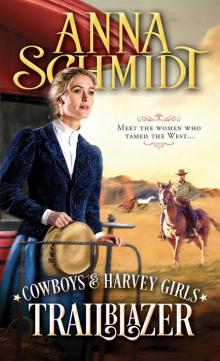 Trailblazer
Trailblazer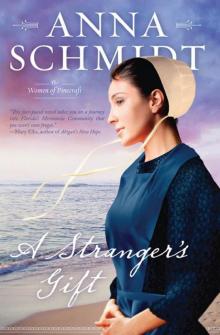 A Stranger's Gift (Women of Pinecraft)
A Stranger's Gift (Women of Pinecraft)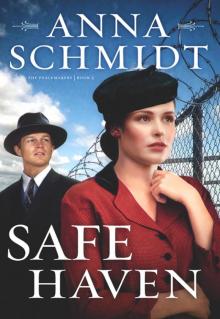 Safe Haven
Safe Haven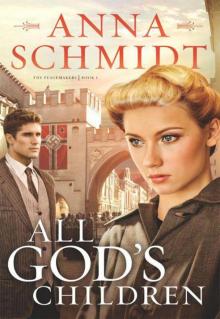 All God's Children
All God's Children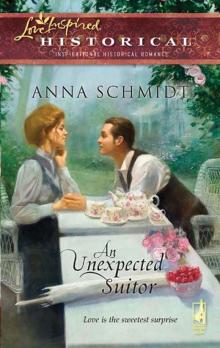 An Unexpected Suitor
An Unexpected Suitor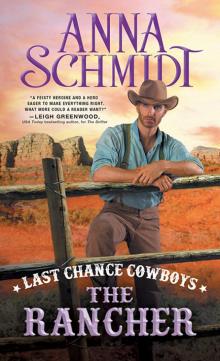 Last Chance Cowboys
Last Chance Cowboys Christmas Under Western Skies
Christmas Under Western Skies Love Finds You in the City at Christmas
Love Finds You in the City at Christmas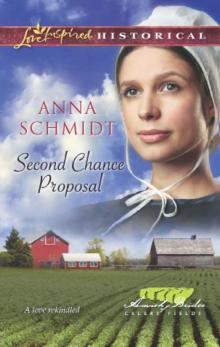 Second Chance Proposal
Second Chance Proposal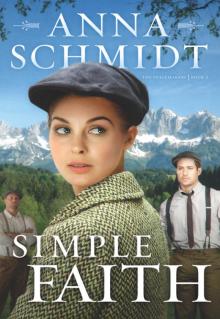 Simple Faith
Simple Faith Mother's Promise
Mother's Promise A Groom for Greta (Amish Brides of Celery Fields)
A Groom for Greta (Amish Brides of Celery Fields)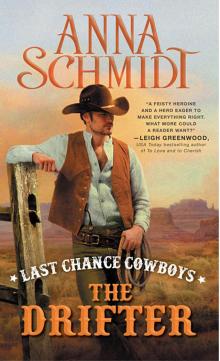 Last Chance Cowboys: The Drifter
Last Chance Cowboys: The Drifter The Pastor Takes a Wife
The Pastor Takes a Wife Hannah's Journey
Hannah's Journey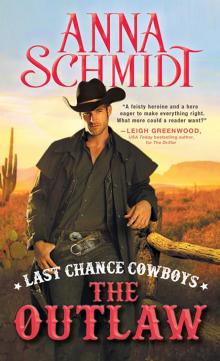 Last Chance Cowboys: The Outlaw
Last Chance Cowboys: The Outlaw Sister's Forgiveness
Sister's Forgiveness